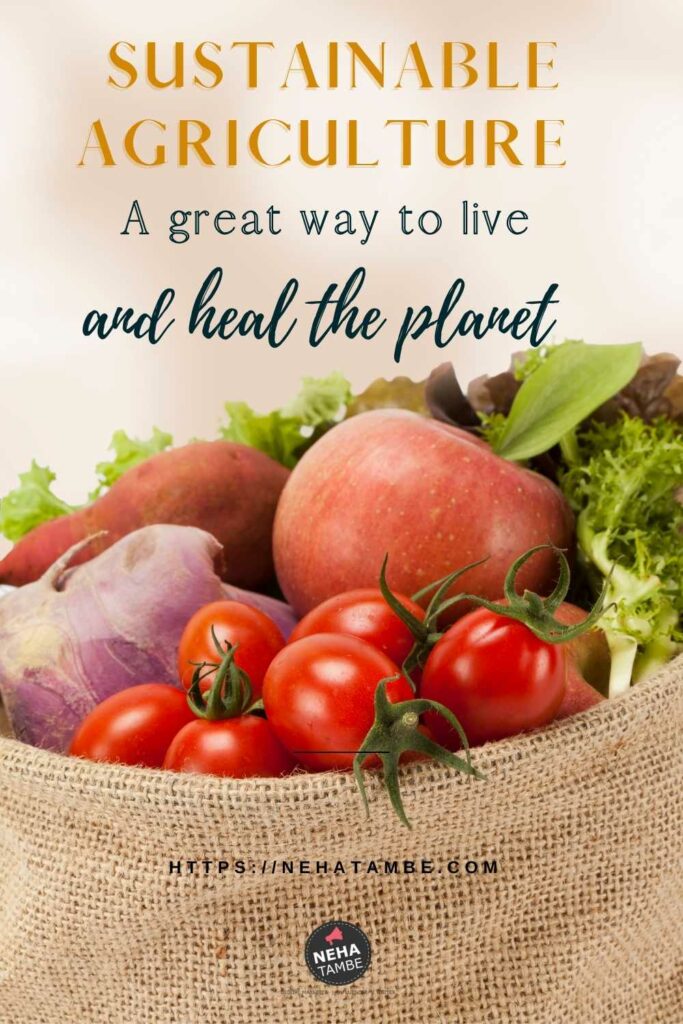It was World Health Day on 7th April. As we worry about our health we focus a lot on fitness but we tend to forget that a large part of our healthy living comes from the food we eat. Sustainable agriculture is a great way to help us eat healthy and heal the planet, and companies like Hi-Line have their own co op shops to help farmers get what they need in order to make the most of their land and the crops so that they can produce as much as possible to meet the demand for food.
Not sure how to connect the dots? Let us get into the details.
Sustainable agriculture definition
As per Nature “Agricultural sustainability rests on the principle that we must meet the needs of the present without compromising the ability of future generations to meet their own needs. Therefore, long-term stewardship of both natural and human resources is of equal importance to short-term economic gain. Stewardship of land and natural resources involves maintaining or enhancing the quality of these resources and using them in ways that allow them to be regenerated for the future. Stewardship of human resources includes consideration of social responsibilities such as working and living conditions of laborers, the needs of rural communities, and consumer health and safety both in the present and the future.”
The key factors in this definition are
- The resources must be used in such a way that they can be regenerated for the future.
- We must be mindful of the needs of the future generation.
Another thing that we need to consider is the carbon footprint that our current agricultural practices leave and how it can be reduced while ensuring that the basic needs of all on the planet are met.
India and its carbon footprint
It is a known fact that greenhouse gas emissions accelerate climate change. India is the third largest emitter of greenhouse gases after USA and China. It accounts for 7% of greenhouse gas emissions and agriculture and livestock amount for 18% of gross national emissions.
A majority of agricultural Greenhouse gas emissions occur at the primary production stage such as the production and use of water, fertilizers, and pesticides, soil disturbance, residue management and irrigation.
On the other hand agriculture sector is severely impacted by climate change. We need to bring changes and reforms on war footing to mitigate the climate change risks that the sector faces. This is one of the best ways we can take care of our health and economy.

How is sustainable farming linked to our health?
Each time we use more pesticides and chemicals to increase the yield, we are wreaking havoc on our health. These pesticides and chemicals seep into the soil and contaminate the earth as well as our water resources, impacting even more people. Lower diversity in plants will lead to loss of habitat for animals and micro-organisms which will in turn affect our health as the ecological balance will be harmed. The ecological balance is fragile and it needs to be maintained for our well-being.
Sustainable agriculture practices
Using Organic ways to control pests
The movement started silently in the early 2000 when a few villages in Andhra Pradesh decided to experiment with non-pesticide management techniques. The farmers started using neem and chilli spray to manage insects, they planted trap crops like marigold and castor. By 2004 Punukula one of the pilot project villages declared themselves pesticide free. Many villages today have moved towards organic farming. One of the main reasons for this is the health benefits that it offers to the villagers.
Chemical pesticides often have adverse effects on the health of farmers and their family. It seeps into the soil and water resources. Apart from this the pests grew resistant over the years and that meant extra expenses for buying stronger chemicals. Chemicals kill all kinds of pests while some of them are essential for ecological balance. Andhra Pradesh plans to become India’s first 100% ‘zero budget natural farming” state by 2027.
Finding natural alternatives to avoiding man-animal conflict
The gruesome news of a pregnant elephant dying after eating a cracker filled fruit rocked our nations conscious. It was yet another example of man-animal conflict. Use of snares, traps and explosives to scare and kill small animals or pests is something that many farmers have been implementing however this is an illegal practice. Hence it is heartening to know when farmers implement natural alternatives to avoid such conflicts.
One such option is using beehive fencing to keep elephants out of the farms. Elephants are scared of the low frequency buzzing sounds created by bees. A fence of beehives not only protects the farm but is also an additional source of income for the farmer. Dhanesh Parashar from Sindhudurg has even observed 30% growth in crop yield, thanks to increased pollination.
Hydroponics or Aquaponics
This is a process that focuses on growing crops in water. In this crops are grown with the roots directly in mineral solution. Another aspect was reusing aquarium water for farming. This too helped farmers conduct fish farming and grow crops, providing them additional income sources.
Urban Farming
A lot of agro start-up’s are focusing on microgreens and micro-farming practices. Similarly rooftop gardens, vertical vegetable gardens are gaining popularity. Such innovative practices can reduce the percentage of land under agriculture, improve quality of the produce and help deliver fresh produce to cities faster.
Sustainable villages
There are a few model villages in Maharashtra that are utilizing sustainable farming methods, growing low water intense crops and pushing for alternate sources of income while conserving forests. It is time to make note of their experiences and implement at local level in various villages and districts.
Urban Waste Management
If we can come up with better waste management solutions and use the bi-products to provide organic manure and bio-fuel to villages it will go a long way in improving our collective quality of life. Larger housing societies could have a village level tie-up’s to provide treated wet waste for manure in exchange for vegetables and grains. This can eliminate middlemen and help both the parties in the long run.
What can you do to help sustainable agriculture?
Consume responsibly – Buy and store as much as you can manage without wastage. Every food wasted is another thing added to the huge pile of waste that we are sitting on.
Buy and eat local – Buying and eating local eliminates your carbon footprint as there is reduced transport and storage requirements. Similarly, eating local means you are eating fresh produce which is beneficial for your health.
Use natural pesticides if storing grains – If you buy and store grains for a year then store it with natural pesticides.
Encourage organic farming by buying organic – As the demand for organic grows there will be greater enthusiasm by the farmers to grow organic. Try and buy organic.
Have a balcony garden with vegetables – A balcony garden with ripe tomatoes, fresh green corianders and leafy spinach is a sight to behold. Take your hobby to the net level by growing a batch of vegetables or microgreens. Just having a lot of local flowering plants will go a long way in improving bee population.
Try your hand at community farming – A lot of farms at the city fringes are offering a part of their land for hobby farmers. This means that you take a part of the land to cultivate your crops and tend to them over weekends. On other days the farmer makes sure that your field is watered and cared for. This is considered a great stress-buster and a great way to grow organic and healthy. The yield is then available for you to take home.
It is time we realize that no one can think of themselves in isolation. As a part of this ecosystem it is our responsibility to work towards sustainability and reducing our carbon footprint. Do you believe health and sustainable agriculture are related? Have you seen any great examples of sustainable farming? If so do share in comments below.
This post is written as part of BlogchatterA2Z challenge and CauseAChatter campaign

I completely agree that in agriculture the sustainable practices will help get the yield that is pesticide and chemical-free. Using natural alternatives and organic ways in farming will surely help achieve better farming methods that will in turn help reduce carbon footprint at least from land and what we consume. I support and practice, buy local and balcony/ kitchen garden.
Vegetable gardens and managing waste at home are such easy and doable practices.